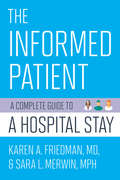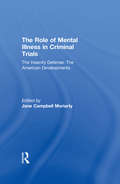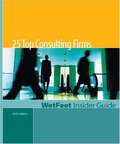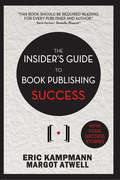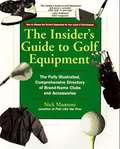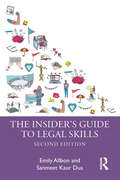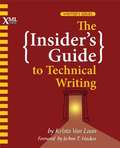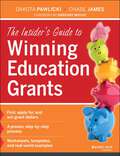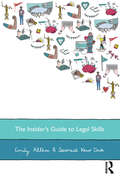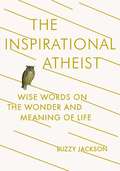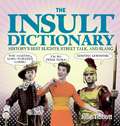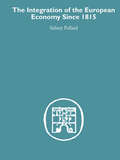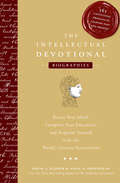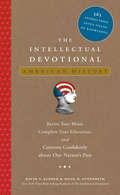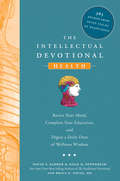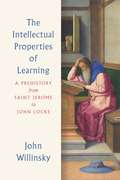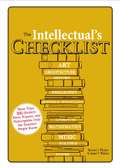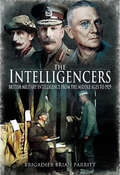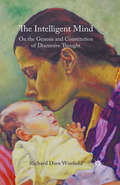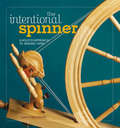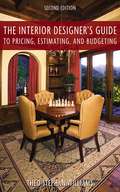- Table View
- List View
The Informed Patient: A Complete Guide to a Hospital Stay (The Culture and Politics of Health Care Work)
by Karen A. Friedman Sara L. MerwinEven the most capable individuals are challenged when confronted with the complexity of the modern hospital experience. The Informed Patient is a guide and a workbook, divided into topical, focused sections with step-by-step instructions, insights, and tips to illustrate what patients and their families can expect during a hospital stay. Anyone who will experience a hospital stay—or friends or family who may be in charge of a patient’s care—will find all the help and advice they could need in the detailed sections that cover every aspect of what they can expect.Karen A. Friedman, MD, and Sara L. Merwin, MPH, offer hands-on advice about how patients, health care providers, and medical staff can work together to achieve good outcomes. Through anecdotes, tips, sidebars, and clinical scenario vignettes, The Informed Patient presents ways to enhance and optimize a hospital stay, from practical advice on obtaining the best care to dealing with the emotional experience of being in the hospital.
The Inherent Right of Self-Defence in International Law
by Murray Colin AlderDetermining the earliest point in time at which international law authorises a state to exercise its inherent right of self-defence is an issue which has been debated, but unsatisfactorily reasoned, by scholars and states since the 1960's. Yet it remains arguably the most pressing question of law that faces the international community. This book unravels the legal and factual complications which have obscured the answer to this question. In contrast to most other works, it takes an historic approach by tracing the evolution of the rights, rules and principles of international law which have governed the use of force by states since the 16th century. Its emphasis on self-defence provides the reader with a new and complete understanding of how and why the international legal framework limits defensive force to repelling an imminent threat or use of offensive force which is directed at the territory of a state. Taking an historic approach enables this book to resurrect an understanding of the human defensive instinct which has guided the formation of the international law of self-defence. It also explains the true legal nature and scope of the inherent right of self-defence, of anticipatory self-defence and provides a definition of the legal commencement of an armed attack for the purpose of Article 51 of the Charter. Finally, the reader will receive a unique source of research materials and analysis of state practice and of scholarly works concerning self-defence and the use of force since the 16th century, which is suitable for all readers of international law around the world.
The Insanity Defense: The Role of Mental Illness in Criminal Trials
by Jane Campbell MoriartyWhether the accused is competent to stand trial, whether the plaintiff is competent to accuse, or whether a witness is competent to testify has had a long legal history. Such questions draw legal reasoning into areas of ethical reflection and scientific debate deeply rooted in the moral history of the United States. Mental competence has come to play a central and controversial role in proving guilt, and in evaluating the severity of a crime and its corresponding punishment. This compendium brings together the major legal precedents and legal commentaries that have defined the role of mental illness in criminal trials throughout U.S. history. The reprint collection considers, among other issues, the evolution of the Supreme Court's position on the insanity defense and mental retardation, how these affect one's competency to stand trial or be executed, and how these affect culpability and punishment. Each volume begins with an introductory essay, and includes both cases and commentary. Scholars as well as students will find these volumes a useful research tool.
The Insider Guide to the 25 Top Consulting Firms (2005 edition)
by WetFeetConsulting firms are traditionally among the largest employers of top MBA and college graduates. This WetFeet Insider Guide profiles 25 top firms, with key numbers and recent milestones for each, from mergers and acquisitions to global expansion; the inside scoop on what it's like to work there; hiring information, including how to make contact and with whom; and interviewing tips.
The Insider's Guide to Book Publishing Success
by Eric Kampmann Margot AtwellThe publishing industry is changing rapidly, and there are more options for authors than ever before. Should you find an agent and search for a traditional publishing deal or consider self-publishing? Should you print hardcover copies or opt for an ebook-only launch? Should you hire a publicist? This easy-to-read, nuts-and-bolts guide covers everything from what to look for in? a contract to how many copies to print. Some of the topics covered are choosing a publishing strategy, the editorial process, design, printing, sales and distribution, marketing and publicity.?
The Insider's Guide to Golf Equipment: The Fully Illustrated, Comprehensive Directory of Brand-Name Clubs and Accessories
by Nick MastroniCharts and photographs compare and contrast the quality, characteristics, and suggested retail cost for all equipment so golfers can discover the best combination of performance for their needs and price for their budget. Includes information for women golfers and left-handed golfers.
The Insider's Guide to Legal Skills
by Emily Allbon Sanmeet Kaur DuaConfused by cases? Stuck on statutes? Or just unsure where to start with writing, research or revision? The Insider’s Guide to Legal Skills will show you what you need to succeed, applying skills in their real-world context and helping you get to grips with legal method and thinking. Making use of problem-based learning and examples throughout, the fully updated second edition of this practical and accessible guide will provide you with a clear guide to skills within the law degree, including online learning. It will show you how to make the most of these skills in assessment and also help you to see their importance to a future legal career. Designed for students who want a clear overview of what a law degree is all about, the book has been built on the skills curriculum, and is a suitable text for Legal Skills, Methods and Reasoning courses as well as a general introduction to law, or pre-reading for those considering a law degree.
The Insider's Guide to Technical Writing
by Krista Van LaanEvery complex product needs to be explained to its users, and technical writers, also known as technical communicators, are the ones who do that job. A growing field, technical writing requires multiple skills, including an understanding of technology, writing ability, and great people skills. Whether you're thinking of becoming a technical writer, just starting out, or you've been working for a while and feel the need to take your skills to the next level, The Insider's Guide to Technical Writing can help you be a successful technical writer and build a satisfying career. Inside the Book Is This Job for Me? What does it take to be a technical writer? Building the Foundation: What skills and tools do you need to get started? The Best Laid Plans: How do you create a schedule that won't make you go crazy? How do you manage different development processes, including Agile methodologies? On the Job: What does it take to walk into a job and be productive right away? The Tech Writer Toolkit: How do you create style guides, indexes, templates and layouts? How do you manage localization and translation and all the other non-writing parts of the job? I Love My Job: How do you handle the ups and downs of being a technical writer? Appendixes: References to websites, books, and other resources to keep you learning. Index
The Insider's Guide to Winning Education Grants
by Dakota Pawlicki Chase JamesFind, apply for, and win grant dollars for the classroom This accessible guide offers a proven, step-by-step process for researching, writing, applying for, and winning education grants. The book educates readers on the basics of grant writing, including what sources are the most reliable for securing education funding. It also serves as a practice tool, with worksheets, proposal templates, real-world examples, and advice from grant-winning teachers to help instill confidence about navigating this somewhat daunting process. Offers a proven formula for winning education grants in clear, step-by-step instructions Includes a wealth of handy tools, worksheets, templates, and teacher-tested advice Outlines the four main components of money-generating education grants Based on UNITE's celebrated "Grant Writing Teacher" Professional Development series The book's step-by-step process is filled with illustrative examples of successful grant proposals.
The Insider’s Guide to Legal Skills
by Emily Allbon Sanmeet Kaur DuaConfused by cases? Stuck on statutes? Or just unsure where to start with writing, research or revision? The Insider’s Guide to Legal Skills will show you what you need to succeed, applying skills in their real-world context and helping you get to grips with legal method and thinking. Making use of problem-based learning and examples throughout, this practical and accessible guide will provide you with a clear guide to skills within the law degree and how to make the most of them in assessment, but also help you to see their importance to a future legal career. Designed for LLB/GDL students who want a clear overview of what a law degree is all about, the book has been built on the skills curriculum, and is a suitable text for Legal Skills, Methods and Reasoning courses as well as a general introduction to law, or pre-reading for those considering a law degree.
The Inspirational Atheist
by Buzzy JacksonLike all people, atheists contemplate issues of love, death, and morality, and in times of stress we long for solace and inspiration. A collection of uplifting quotations from some of mankind's most important philosophers, scientists, writers, and even comedians, THE INSPIRATIONAL ATHEIST will be a treasured daily companion for the growing demographic of humanists who believe that life has meaning when we live it meaningfully, independent of the existence of a higher power. With words from Carl Sagan, D. H. Lawrence, Julia Child, Douglas Adams, Charlotte Bronte, Bertrand Russell, Ralph Waldo Emerson, George Carlin, Joan Didion, Alfred Lord Tennyson, Thomas Jefferson and dozens of others on topics ranging from Love and Nature to Wisdom and Beauty, this book is a celebration of the sublime without the divine.
The Inspirational Atheist
by Buzzy JacksonLike all people, atheists contemplate issues of love, death, and morality, and in times of stress we long for solace and inspiration. A collection of uplifting quotations from some of mankind's most important philosophers, scientists, writers, and even comedians, THE INSPIRATIONAL ATHEIST will be a treasured daily companion for the growing demographic of humanists who believe that life has meaning when we live it meaningfully, independent of the existence of a higher power. With words from Carl Sagan, D. H. Lawrence, Julia Child, Douglas Adams, Charlotte Bronte, Bertrand Russell, Ralph Waldo Emerson, George Carlin, Joan Didion, Alfred Lord Tennyson, Thomas Jefferson and dozens of others on topics ranging from Love and Nature to Wisdom and Beauty, this book is a celebration of the sublime without the divine.
The Insult Dictionary
by Julie TibbottDo you long for the days when a jerk was a "cad"? Want to tell that "swillbelly" to clean up his table manners and that grumbling "glump" to stop whining? Would you like a way of saying simpleton that's not quite so simple--"ninnyhammer," perhaps?All this nastiness and more can be found in the pages of this fun reference book. With insults ranging from Roman times (lutum lenonium = filthy pimp) and Shakespearean snipes (I'm talking to you, you knotty-pated fool) to salty pirate-speak and Wild West zingers, you're sure to find an insult for everyone, be they a helminth (a parasite in Ancient Greece) or a swinge-buckler (an Elizabethan braggart).Chapters are organized chronologically by historical period--Ancient Attacks, Medieval Madness, Edgy Elizabethans, Victorian Venom, Jazz Age Jibes, and Cold War Cuts--and include themed sidebars focusing on Pirate Put-Downs, Hobo Huffs, and Cowboy Curses, as well as samplers for words with many different sayings per period. Fun, a little bit lewd, and incredibly informative this is a must-read for humor fans, history buffs, armchair etymologists, and the most sneaping of breedbates.
The Integration of the European Economy Since 1815
by Sidney PollardSidney Pollard has provided a concise survey of economic issues for students of the European community. Going back to 1815, he links the progress of industrialisation in Europe to the relative ease with which ideas, men and capital were able to cross national frontiers. European frontiers make little economic sense and frequently cut across vital natural links. Professor Pollard shows how open frontiers speeded progress, in the particular circumstances of the spread of industrialisation from Britain to Western Europe and then to the rest of the continent, adn opened up new markets and opportunities of learning and technology transfer. Closed frontiers and the national selfishness of economic warfare led in contrast to stagnation, hostility and at times to all-out war. This classic study was first published in 1981.
The Intellectual Devotional: Revive Your Mind, Complete Your Education, and Acquaint Yourself with the World' s Greatest Personalities (The Intellectual Devotional Series)
by David S. Kidder Noah D. OppenheimThe fifth installment of this bestselling series features 365 captivating entries about the most celebrated personalities in history. <P><P>Like its compulsively readable predecessors, The Intellectual Devotional: Biographies is organized into seven categories, one for each day of the week. With their trademark wit and style, authors David Kidder and Noah Oppenheim offer an array of fascinating facts about major figures from Atilla the Hun to Desmond Tutu. <P>In this daily devotional, learn about: <br>• authors and artists, from Homer and Ovid to Oscar Wilde and Virginia Woolf• leaders, such as Queen Elizabeth I, Abraham Lincoln, Susan B. Anthony, and Napoleon Bonaparte <br>• innovators, from Johannes Gutenberg to Isaac Newton to Werner Heisenberg• philosophers, including Socrates, Epicurus, Friedrich Nietzsche, and Jean-Paul Sartre <br>• rebels and reformers, from Joan of Arc and Spartacus to Galileo and Che Guevara <br>• preachers and prophets, including Lao-tzu, John the Baptist, Martin Luther, and Gandhi <br>• villains, such as Benedict Arnold, Genghis Khan, Ivan the Terrible, and Jack the Ripper <P>This volume shares the personal histories, accomplishments,and troubles of 365 people who have left an indelible mark on the world.
The Intellectual Devotional: Revive Your Mind, Complete Your Education, and Converse Confidently about Our Na tion's Past (The Intellectual Devotional Series)
by David S. Kidder Noah D. OppenheimModeled after those bedside books of prayer and contemplation that millions turn to for daily spiritual guidance and growth, the national bestseller The Intellectual Devotional—offering secular wisdom and cerebral nourishment—drew a year's worth of readings from seven different fields of knowledge. <P><P>In The Intellectual Devotional: American History, authors David S. Kidder and Noah D. Oppenheim have turned to the rich legacy of American history for their selections. <P>From Thomas Jefferson and Benjamin Franklin to Martin Luther King Jr., from the Federalist Papers to Watergate, the giant figures, cultural touchstones, and pivotal events in our national heritage provide a bountiful source of reflection and education that will refresh knowledge, revitalize the mind, and open new horizons of intellectual discovery.
The Intellectual Devotional: Revive Your Mind, Complete Your Education, and Digest a Daily Dose of Wellness W isdom (The Intellectual Devotional Series)
by David S. Kidder Noah D. OppenheimIn this fourth installment of the New York Times bestselling Intellectual Devotional series, authors Noah Oppenheim and David Kidder have partnered with Bruce K. Young, MD, to offer a year's worth of medical knowledge and wellness wisdom. <P><P>Each daily dose in this infectious volume offers insight into the mysterious terrain of the human body and the factors that impact its constitution. Drawn from seven diverse categories, including lifestyle and preventive medicine; the mind; medical milestones; drugs and alternative treatments; sexuality and reproduction; diseases and ailments; and children and adolescents, these 365 entries are as informative as they are functional. <P>From aspirin to the x-ray, headaches to Hippocrates, Viagra to influenza, The Intellectual Devotional: Health will revive the mind and rejuvenate the body. <P>Sure to please devoted intellectuals and newcomers alike, this timely volume sheds new light on an endlessly fascinating subject: ourselves.
The Intellectual Properties of Learning: A Prehistory from Saint Jerome to John Locke
by John WillinskyProviding a sweeping millennium-plus history of the learned book in the West, John Willinsky puts current debates over intellectual property into context, asking what it is about learning that helped to create the concept even as it gave the products of knowledge a different legal and economic standing than other sorts of property. Willinsky begins with Saint Jerome in the fifth century, then traces the evolution of reading, writing, and editing practices in monasteries, schools, universities, and among independent scholars through the medieval period and into the Renaissance. He delves into the influx of Islamic learning and the rediscovery of classical texts, the dissolution of the monasteries, and the founding of the Bodleian Library before finally arriving at John Locke, whose influential lobbying helped bring about the first copyright law, the Statute of Anne of 1710. Willinsky’s bravura tour through this history shows that learning gave rise to our idea of intellectual property while remaining distinct from, if not wholly uncompromised by, the commercial economy that this concept inspired, making it clear that today’s push for marketable intellectual property threatens the very nature of the quest for learning on which it rests.
The Intellectual's Checklist
by Richard J. Wallace James V. WallaceAll five movements of "Beethoven's Missa" solemnis. Check. The films that Kurasawa based on Western works. Check. Dante's "Nine Circles of Hell". Check. These are the sorts of elegant erudition every self-respecting intellectual should know - inside and out. In "The Intellectual's Checklist", aspiring pundits, poets, and philosophers find the arcane checklists that reveal whether they are truly well-versed enough in the arts and sciences of the obscure to warrant the esteemed moniker "Intellectual". From Nietzsche to Newton, Einstein to Eisenstadt, Sappho to Sartre, this elucidating volume gives readers all the esoterica they need to bask in the knowledge that they really do know everything. (Now that they've read this book. )
The Intellectual's Checklist
by Richard J. Wallace James V. WallaceCan you name: All five movements of Beethoven's Missa solemnis. Check. The films that Kurosawa based on Western works. Check. Dante's Nine Circles of Hell. Check. If so, you're off to an edifying start--but that's just round one in this hard-hitting match of wits and wisdom. Take the formidable plunge--and find out if you are truly well versed enough to call yourself an aspiring pundit, poet, and philosopher. Either way, you'll be worthy of the esteemed moniker intellectual by the time you've gone the distance with this book. (As Thoreau is our witness.) Whether you are just beginning to suspect you're the possessor of superior acumen or you'd bet your Homeric Greek translation of The Iliad on it, this book is an essential addition to any personal library.
The Intellectual's Checklist
by Richard J WallaceCan you name:All five movements of Beethoven's Missa solemnis. Check.The films that Kurosawa based on Western works. Check.Dante's Nine Circles of Hell. Check.If so, you're off to an edifying start--but that's just round one in this hard-hitting match of wits and wisdom. Take the formidable plunge--and find out if you are truly well versed enough to call yourself an aspiring pundit, poet, and philosopher. Either way, you'll be worthy of the esteemed moniker intellectual by the time you've gone the distance with this book. (As Thoreau is our witness.)Whether you are just beginning to suspect you're the possessor of superior acumen or you'd bet your Homeric Greek translation of The Iliad on it, this book is an essential addition to any personal library.
The Intelligencers: British Military Intelligence From the Middle Ages to 1929
by Brian ParrittIntelligence about the enemy is a fundamental part of any war or battle; knowledge of the enemys strength, dispositions and intentions are essential for success. This book reveals that for 250 years the British Army resolutely failed to prepare for war by refusing to establish a nucleus of soldiers in peace, trained to obtain intelligence in war. Although there were Scoutmasters and secret spy organizations such as Walsinghams in the 15th Century, in no major conflict from the Civil War of 1642, including the Peninsula, the Crimea, Burma, Egypt and South Africa and in the multitude of small wars that gained Britain an empire, was there any staff branch or unit specifically pre-established to gain intelligence or frustrate the enemy from obtaining intelligence. Yet the story of British military endeavor over 250 years is a remarkable story of individuals bravery, achievement and success. We read of the Scoutmaster whose role was to gather intelligence on the Kings enemies and of Walsinghams secret organization at the time of Elizabeth I. During the long years of war against France culminating in the Napoleonic Wars, spy masters developed on an ad hoc basis. In the Nineteenth Century, despite the power and reach of Empire, no central intelligence organization existed. Enterprising young officers worked wonders but failures such as those in the Boer War cost the Nation dearly. It took the reverses in the Great War to create an Intelligence Corps. But even that was disbanded postwar.
The Intelligent Mind: On the Genesis and Constitution of Discursive Thought
by Richard Dien WinfieldThe Intelligent Mind conceives the psychological reality of thought and language, explaining how intelligence develops from intuition to representation and then to linguistic interaction and thinking. Overcoming the prevailing dogmas regarding how discursive reason emerges, this book secures the psychological possibility of the philosophy of mind.
The Intentional Spinner: A Holistic Approach To Making Yarn
by Judith MackenzieOffering a blend of technical knowledge, history, and easy-to-use tips, this inspiring collection of spinning wisdom deftly explores the three fundamental areas of yarn production: understanding fibers, managing yarn structure, and making yarns that precisely meet the spinner's needs. The rich, historic traditions of plant and animal fibers are fascinatingly juxtaposed with recent advances in synthesized fiber and mankind's use of fibers in the past, present, and future, while detailed, image-laden instructions for four intermediate projects demonstrate the range of possibilities, from sturdy, plied yarns to playful, novelty yarns. Spinners are also offered guidance on planning a project from start to finish, as well as how to care for and store completed projects.
The Interior Designer's Guide to Pricing, Estimating, and Budgeting
by Theo Stephen WilliamsThis second edition is updated throughout and includes additional material on time management and numerous interviews with leading designers. Empowered by the step-by-step guidance in this book, interior designers will be able to establish prices and budgets that make their clients happy and their businesses profitable. Written by a designer and veteran expert on pricing, estimating, and budgeting systems, the book provides practical guidelines on how to value the cost of designing commercial or residential interiors, from the designer's creative input to the pricing of decorating products and procedures.The book shows how to determine a profitable and fair hourly rate, balance the client's budget with his or her wishes and needs, negotiate prices with suppliers and contractors, write realistic estimates and clear proposals, manage budgets for projects of all sizes and types, and position the firm's brand in relation to its practices. Interviews with experienced interior designers, case studies, and sidebars highlight professional pitfalls and how to master them, from daily crisis management and self-organization to finding the perfect office manager.
